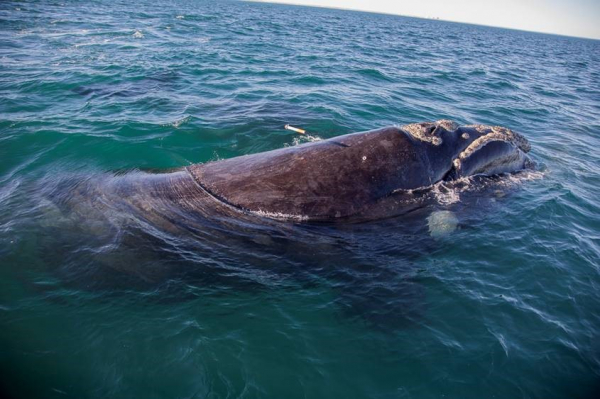Latest satellite tagging information shows that
nothing is simple in cetacean science
A programme aiming to build a clearer picture of southern right whale migration and feeding grounds has revealed a substantial variety of animal behaviours.
Over the last four years, scientists have deployed satellite tags in order to understand the movements of a southern right whale population known to give birth and nurse calves in the waters around Peninsula Valdes, Argentina. This work is part of a wider programme of research, prompted by a mysterious, seasonal mass mortality event, which mainly affects young calves and has recorded the deaths of 672 whales in ten years.
The satellite tags have been used each year since 2014, in conjunction with aerial and vessel surveys and multi-disciplinary workshops, all aiming to improve knowledge of the movements and migratory behaviour of this population. Only when a clearer picture is established can scientists reliably evaluate a range of theories on the cause of the mass mortality events.
This year eight tags were successfully deployed bringing the total number so far to twenty four. The tags have an average lifespan of 3-4 months and have so far transmitted 7 weeks of valuable data to an international team of scientists. In previous years some of the tags have lasted much longer than average. Overall, the tags show substantial variations in the movements of the whales individually and by year, and suggest at least three separate feeding areas. The routes taken by some whales tagged at different locations also provide the first indication that they may use habitats other than Peninsula Valdes along the South American coast.
These findings are interesting and informative. While the team has unearthed some novel and intriguing movements in this and previous years, the results also raise more questions, particularly regarding the different behaviours of the tagged animals from one year to the next. This emphasises the complexity of the task to establish any links with the primary reasons for the mass mortality events. The team will continue to analyse the data being transmitted from this year’s tags and add the latest pieces of information to the puzzle, reporting the information to the IWC Scientific Committee meeting next April.
The IWC’s commitment to a better understanding of the seasonal mass mortalities began with the first of a series of workshops in Argentina in 2010, and in support for priority research for this population. The IWC helped sponsor the 2017 tagging efforts with funding to the multi-national team of scientists from the the US Government’s National Oceanic and Atmospheric Administration, the Wildlife Conservation Society, Instituto Aqualie, CONICET of Argentina, Fundación Patagonia Natural, Instituto de Conservación de Ballenas, and the University of California Davis.
For previous information about the southern right whale tagging programme click here.
For more information about the southern right whale mass mortality events at Peninsula Valdes click here.
For information about an IWC Conservation Management Plan for the western South Atlantic population of southern right whales click here.

